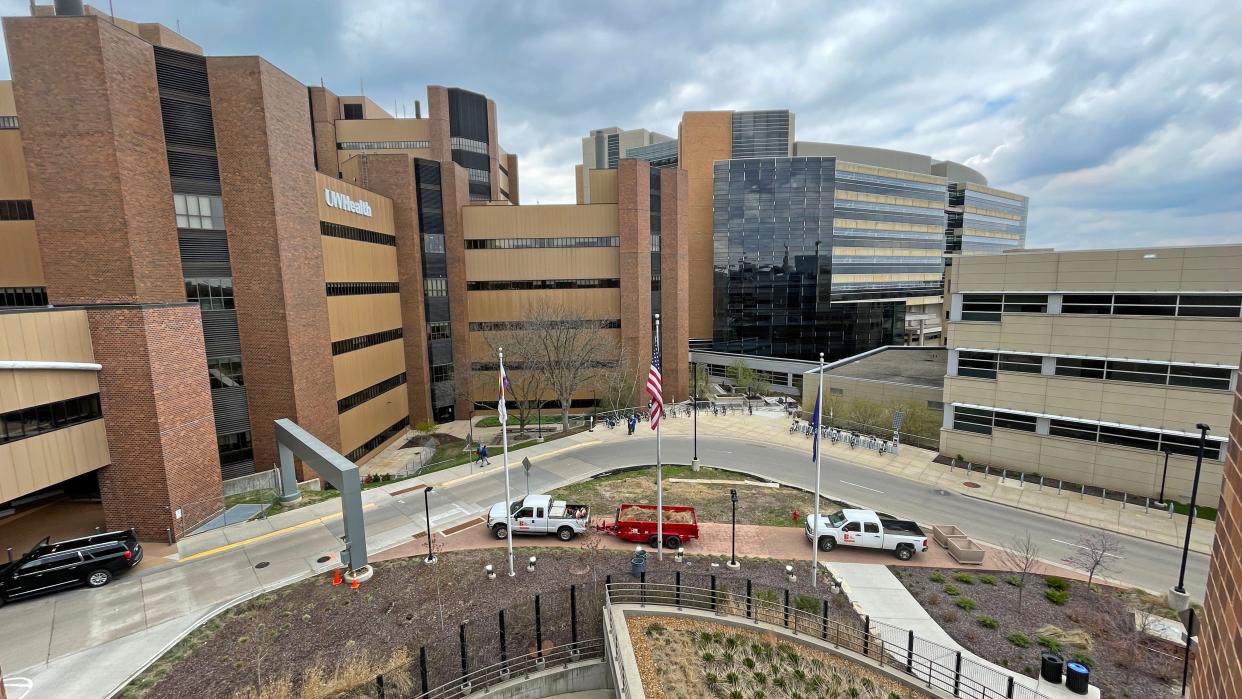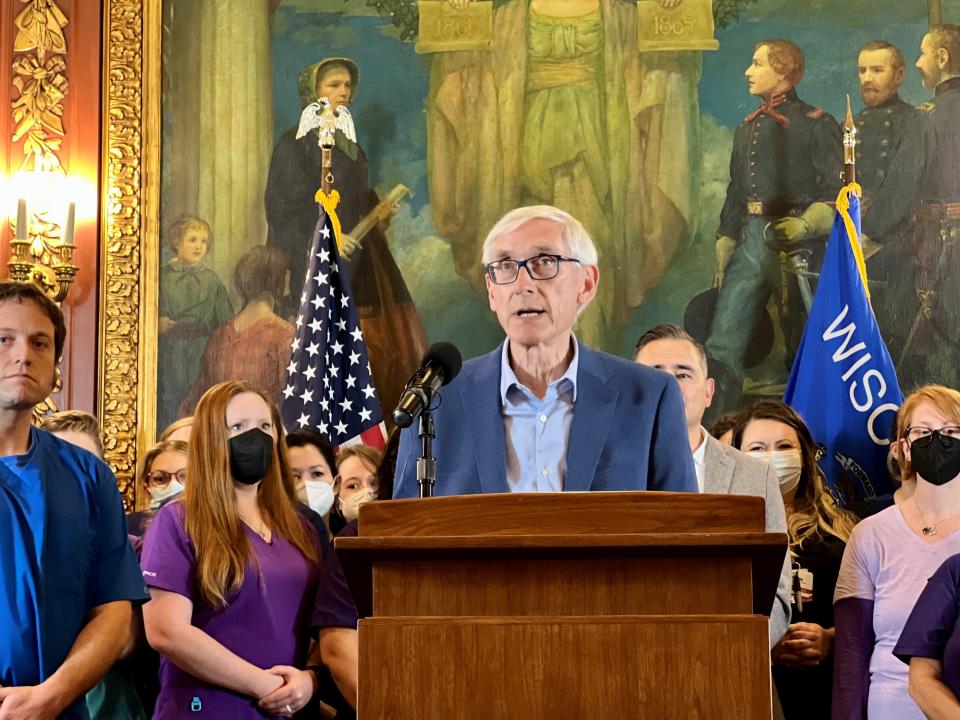UW Health nurses' union submitting 'risk to patient safety' forms to state health department

Members of the UW Health nurses' union plan to deliver safety violation forms Thursday to the state health department, an aggressive move that airs what typically is internal information concerning safety incidents or near misses to the state and the public.
Three nurses interviewed by the Milwaukee Journal Sentinel said the UW Health branch of SEIU Wisconsin resorted to creating the "Notice of Risk to Patient Safety" forms and distributing them to staff nurses at the Madison-based hospital in an effort to push the UW Health administration to address the "spiraling crisis" of understaffing, turnover and burnout.
“We’ve lost so many veteran nurses and are so short-staffed that right after my six-month orientation, I was assigned to teach a brand new nurse, even though I was still trying to get my feet under me," Rose Askevold, a registered nurse in the surgical department said. "At times we have nurses with just a year or so of experience being assigned the role of charge nurse, meaning they’re responsible for the entire surgical department for a Level 1 Trauma Center. It’s a really scary situation.”
The hospital's top administrators were made aware of the forms and how the union planned to use them at what turned out to be a heated "meet and discuss" meeting in September that resulted in administrators leaving the room, according to Shari Signer, a union nurse who is part of the meetings held every other month between a handful of nurses and hospital officials.
The meetings are taking place as a result of a negotiation brokered with Gov. Tony Evers to avert a nursing strike in September of 2022.
According to an email sent to all UW Health staff from UW Health CEO Dr. Alan Kaplan following this meeting, “SEIU and a small group of our nurses reached out to us to say they have gathered patient safety issues from UW Health staff and threatened to submit them to the Department of Health Services (DHS) if we did not meet their demands related to compensation.
We told them that any compensation issues would be addressed through our normal processes and requested that the union share those patient safety issues with us so we could review them and take action to address any safety issues. They have so far refused to share them with us.”
Nurses said they have shared a detailed summary of the forms with administration.
"Patient safety is not a bargaining chip in this health system," Kaplan said in the email dated Sept. 25.
To date, the nurses have collected 100 forms. Many detail issues with UW Health's inpatient surgical department, where Askevold works. Sara Booth, a nurse with 12 years' experience, also works there.
Booth explained that during surgeries, there are nurses inside a sterile field with the surgeon and the patient. They assist the surgeon, handing them whatever they need. Then there are nurses outside the sterile field. They chart, get medications ready and update family members.
During a recent shift, Booth found herself working with two inexperienced nurses, one was two days off orientation.
"The surgeons are very aware. They direct their attention (and requests) to the nurse they are most familiar with,” Booth said. “Even though the surgeon asks a nurse outside the sterile field to perform a task, she is really telling me to tell her to do it right now."
At the end of the shift she filled out a form.
"There was a lot of stress that day, a lot of confusion over what needed to be done and when it needed to be done," Booth said. "There was a lot of prompting by me while also trying to listen to my surgeon. And this happens a lot when I am doing multiple things at the same time. I don't feel it is fair for patient care."
The hospital has its own process for reporting safety concerns or safety events. Known as the HERO event reporting system, it allows the administration to track and "identify areas of system vulnerability and possible system enhancements," according to a statement from UW Health.
In Kaplan's email to staff, he said reporting to the HERO system was up 24% over the last calendar year, "which is a great sign that we all share this commitment to safety."
The move to submit the forms to the state comes nearly two months after the nurses announced they would be increasing pressure on the hospital administration if it did not provide greater pay transparency and remove salary caps.
Hospital officials announced a new 3.5% annual pay increase for staff and a 2.2% increase to the pay scales in August. Staff already at the top of their pay scale will receive the annual increase as a lump sum payment instead of a base salary increase.
Consequently, the most experienced nurses do not receive a permanent raise. They receive a bonus check of several hundred dollars.
Sara Benzel, a UW Health spokesperson, said in an emailed response to the Milwaukee Journal Sentinel, that the hospital has been “very transparent" that it targets paying at the 75th percentile to peer organizations and moved its nursing market reviews on compensation to an annual schedule “to ensure we stay competitive in a volatile labor market.”
She said over the past year, nurses have not only seen a 3.5% annual increase but an 8% increase following a market salary review.
“We’ve hired a net increase of 250 new nurses and our turnover rate is 11.3%, which is significantly below the national median of 19.9%,” Benzel said. “Not only do nurses want to come work at UW Health, they are more likely to stay here as well.”
In addition to the compensation requests, the nurses are angered by what they see as the elimination of the "SOS," or Save our Shift team.
The team, unique to the UW, was described by the nurses as a team of highly skilled, experienced critical care nurses who traveled to any unit in the hospital to fill staffing gaps or respond to emergency situations.
"It was their job to go to where they were needed, anywhere in the hospital," Shari Signer, a registered nurse who has worked at the hospital for 20 years, said.
The nurses on the team were a resource to call if other nurses needed help, prior to calling a code if a patient was in critical distress.
Signer said the union was actively advocating for the SOS team to be expanded, not eliminated.

“If they eliminate the SOS nurse team, UW Health is taking a giant step backwards on patient safety and quality of care,” Signer said. "Without them, we will have worse staffing and patient care outcomes.”
Benzel said that the SOS nurses are "a role, not a team" that covers various assigned tasks. She said the role is now being filled through its critical care float team. The hospital is also expanding its venous access team "to fill some of the responsibilities (of the SOS team) related to difficult IV placements."
"Far from being eliminated, the team has evolved to allow them to practice at the top of the license by focusing their expertise on caring for our critically ill patients at the bedside in our critical care units throughout the hospital," Benzel said.
Signer says this leaves inexperienced nurses or units that are short-staffed without the ability to call a designated group for help, as not all units are considered critical care.
In the email to staff, Kaplan said the administration has been working "collaboratively and professionally" with SEIU under the guidelines agreed upon with Evers.
"However, we cannot allow patient safety to be utilized as a tactic in a union organizing drive," Kaplan said in the email. "If you take one thing away from this episode, I hope it is our commitment to quality and safety is real and enduring."
The nurses plan to deliver the forms to the state health department on Wilson Street in Madison at 4 p.m. Thursday.
“The safety of patients and providers is a top priority for the Wisconsin Department of Health Services. As we have yet to receive the documents or forms that you have mentioned, we cannot comment on them,” a department spokesperson told the Journal Sentinel in an email Wednesday.
Jessica Van Egeren is the Milwaukee Journal Sentinel's enterprise health care reporter. She can be reached at jvanegeren@gannett.com.
This article originally appeared on Milwaukee Journal Sentinel: UW Health nurses union submitting patient safety forms to state

